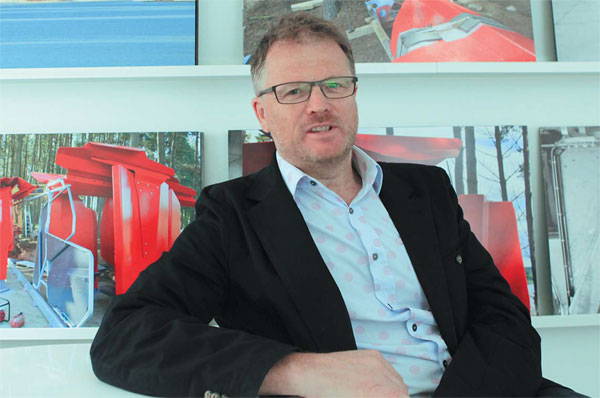The world's knowledge factory
By Cecily Liu ( China Daily Europe ) Updated: 2014-07-25 06:12:52
|
Bob Sheil, director of the Bartlett School of Architecture, says given the influence China now has on the world stage, he is determined to bring Fabricate to Shanghai. Cecily Liu / China Daily |
British architect says Chinese know-how should be showcased around globe
The director of one of the world's top architectural schools says China could become the world's knowledge factory of the very best in architecture and construction practices.
Bob Sheil is director of the Bartlett School of Architecture, which forms part of the multidisciplinary Faculty of the Built Environment at University College London.
He insists that given China's growing reputation for being able to quality build at speed, the opportunity to experiment and to pass on those skills to the global industry is huge.
He adds that many of the buildings already built and those taking shape across the country could well be used as "prototypes of modern excellence" in design and building techniques, which could act to push the boundaries "of how buildings should be built, as opposed to repeating what's been done before".
Sheil is very much the driving force behind Fabricate, a revolutionary idea in conferencing, that utilizes the connection between academia and the real world to explore new possibilities in architecture.
The first Fabricate - which billed itself as an international peer-reviewed conference - was held in London in 2011, and brought together 350 what Sheil called "pioneers in design and making" within architecture, construction, engineering, manufacturing, materials technology and computation.
That event formed the basis of what has now become an ongoing idea of creating stronger links between academia and practice in architecture.
The second event, took place in Zurich in February in collaboration with the Swiss research institute ETH Zurich, and focused on new technology in architecture and building, and Sheil is hoping the third Fabricate can be held in Shanghai in three years time, to focus on manufacturing and construction.
"The amount of activity in China offers huge potential to push our knowledge of how things are made much further," says Sheil, who is also a professor in architecture and design through production.
His team at the Bartlett School is currently talking with counterparts from Shanghai's Tongji University about the possibility of bringing Fabricate 2017 to China.
"It's an exciting opportunity to open up a conversation about construction and manufacturing on a global scale," Sheil says.
"Shanghai is a perfect location, because delegates will see the speed of construction in the city and really feel the relevance of their conference discussions in such a setting."
He says the event could also potentially help to change the way construction is done in China, by offering local participants technical assistance in producing less energy intensive and more innovative procedures.
Sheil reckons that 500 delegates could be a realistic target for Shanghai and has a mailing list of 1,000 people from around the world waiting to hear about the event.
Fabricate is run using an intriguing concept which is very much focused on industry as opposed to purely academia.
"We've all gone to a lot of conferences that are very boring. People stand up and just read out their papers, and that makes me wonder 'why am I here?', says the straight-talking Sheil.
Instead, Fabricate publishes a book before the event, in which all the papers are published. Delegates get one before the event starts, so the projects themselves can be immediately discussed.
The organizers also ask its speakers not to repeat what they have already written, and instead are told to update the audience on the projects they outline in the book.
"The conference book takes a few months to put together and so in that time projects quickly move on - so those coming to Fabricate get a publication full of valuable, workable information and actual examples of the best projects going on at that time; but more importantly they get the chance to speak to the people involved, and others who are considered the leading names in the industry from around the world, and who are involved in some of the best projects," adds Sheil.
Fabricate conferences normally focus on a number of the world's top architecture projects and organizers then ask the people behind them to eventually write additional book chapters.
But not before they are asked to pitch potential entries, via photographs and 2,500-word summaries.
"That's to attract the best practitioners, who do not have time to write a full length article without guarantee of publication.
"This is different from academics, whose job is to write many papers and send them to different publication," Sheil says.
He says if the potential collaboration with Tongji University works out, the Chinese will take care of the conference venue, chair the event, and arrange for sponsorship.
After visiting Shenzhen, Chongqing, Hong Kong, Guangzhou, Changsha, Shanghai and Beijing in recent months, Sheil says he's "staggered" by the pace and scale of construction going on right across the country.
Work produced in the London-based Bartlett School is regularly awarded prizes for its outstanding quality and experimental nature, and is widely published and exhibited at galleries and events worldwide.
The school's annual Summer Show, meanwhile, attracts more than 10,000 visitors and forms a key event in the UK architectural calendar.
Bartlett-generated work is also regularly selected to feature at the acclaimed Royal Academy Summer Exhibition.
Sheil says given the influence China now has on the world stage, he is determined to bring Fabricate to Shanghai.
The Bartlett School already has commercial cooperation agreements with architectural firms practicing in China, and has enjoyed a steady stream of Chinese alumni who have returned home to work after graduation, "so it makes sense to cement these ties further", he adds.
"We have a rich and strong relationship with China, so there is scope for turning this into projects.
"I feel that in the last two visits we've discussed a lot of potential, but I want to move that now onto a project level," says Sheil.
"China is an exciting market to work in because of its speed of construction, and there is great potential to cooperate with the UK.
"Britain has a huge amount of expertise in design to offer China, including designs for manufacturing and for fabrication, and China has a lot to offer Britain, as very much the world's laboratory," he adds.
Given the size of the Chinese market, Sheil says it should be presenting its technology to the world, but he feels as yet, the Chinese government needs to put better incentives in place for its architects and developers to showcase their work globally.
"It would be great if many Chinese buildings could be use as prototypes of how buildings should be built in future," Sheil adds.
"Its projects are now market-leading in many technologies - for instance, in dealing with different types of climate and land conditions.
"These projects have all been tested and monitored, giving China a massive amount of knowledge in working on all types of building, which should be shared.
"And remember, projects do not finish the day a contractor walks away - some really start to develop at that point."
He says ultimately China can recoup some of the costs of its developments by experimenting with new architectural techniques as projects are ongoing.
"China can gain a huge amount of information on how to make buildings more efficient, last longer, and be more flexible and adaptable, and ultimately save money," adds Sheil.
"The Chinese government needs to encourage its leading construction companies and architects to contribute more to the world in terms of knowledge.
"It also needs to make sure its citizens demand they build and design buildings that people want to live and work in, rather than those they have to live in."
cecily.liu@chinadaily.com.cn
|
|
|
|
|
|
|
|
European Weekly
 We will not give up search, Li vows
We will not give up search, Li vows
International hunt for missing airliner continues after fruitless six-day search























